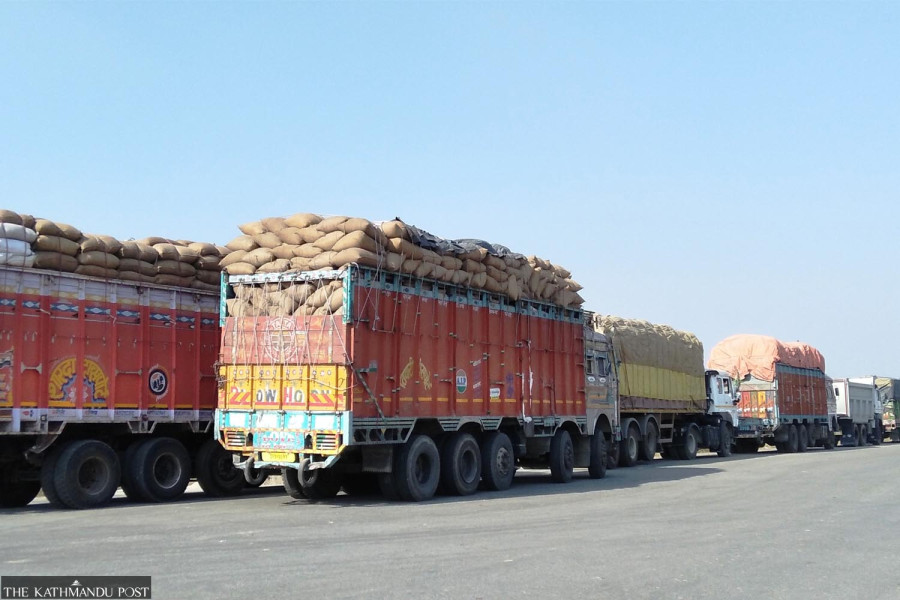Money
Contraband rice flows into Nepal after export ban
Young unemployed men, women and sometimes even the elderly act as carriers for local smugglers, Indian media reports say.
Krishana Prasain
Rice smuggling from India to Nepal has surged to alarming levels since the southern neighbour banned exports of the staple grain, Indian media said.
According to the reports, villagers along the India-Nepal border in Maharajganj, a town in the Indian state of Uttar Pradesh, are mostly involved in smuggling rice into Nepal.
Young unemployed men, women and sometimes even the elderly act as carriers for local smugglers, delivering rice to warehouses across the border. The report said that smugglers are paid up to IRs300 for delivering a quintal of rice to warehouses set up by Nepali traders.
Most of them make multiple trips in a day to earn as much money as possible.
Over 111 tonnes of rice have been seized in the last four months. Lakshminagar, Thoothibari, Nichlaul, Parsa Malik, Bargadwa, Bhagwanpur, Shyam Kat, Farenia, Hardi Dali and Khanuva are some of the villages from where it is very easy to slip into Nepal with contraband rice, said the reports citing police sources.
As India nears crucial elections, its government has stepped up export curbs to stabilise local prices. India has placed controls on sugar, wheat and rice shipments.
Nepali government officials told the Post that India has been ignoring Nepal's request for rice export quotas for more than two months.
“There is no response from the Indian side,” said Gajendra Kumar Thakur, joint secretary at the Ministry of Industry, Commerce and Supplies. “We have requested an export quota for rice, paddy and sugar.”
He said that domestic traders had imported 1 million tonnes of paddy from India.
“As there is enough rice to fulfil our requirement until the next harvest in November, we did not make a follow-up to our request,” he said.
India imposed a ban on the export of non-basmati rice on July 20 considering its own needs.
On August 25, a month after the export ban on non-basmati rice, India slapped a 20 percent export duty on parboiled rice.
Following the ban, Nepal’s Ministry of Industry, Commerce and Supplies formally asked the Indian government for export quotas of 1 million tonnes of paddy, 100,000 tonnes of rice and 50,000 tonnes of sugar in the first week of August.
"The Indian government has created a provision to export sugar to its neighbours only after getting approval from its state governments. Importing sugar through a government-to-government arrangement is not possible immediately," said Thakur.
According to a report published by livemint.com, an Indian business and financial daily newspaper, India may shift sugar exports to the "prohibited" category from "restricted" for the entire 2023-24 (October-September) season, as it is concerned about the impact of the weakest monsoon in five years on sugarcane crops in the major producing states of Maharashtra and Karnataka.
Nepali markets are already short of sugar while the price of rice has been rising steadily.
“On July 20, we made a request to the Indian government through the Indian Embassy in Nepal for the procurement of sugar. On the same day, we also wrote to the Ministry of Finance to procure 20,000 tonnes of sugar through Salt Trading Corporation and Food Management Trading Corporation,” Thakur said.
“But we received the Finance Ministry's response only on September 15,” he said. “The delay in approval has caused a shortage of sugar in the market.”
Nepal could run short of sugar during the year's main festival season as the two government firms tasked with importing the household sweetener got off to a slow start after the Finance Ministry’s delayed response.
The country requires 4 million tonnes of rice annually to feed its population, and the deficit is made up by imports from India. For the past decade, it has been importing rice and paddy from India in large quantities.
The price of rice rose instantly in Nepal after India announced an export ban, though traders say that prices have started to decrease to some extent. Despite having an adequate inventory, traders increased prices on the pretext of the ban, analysts said.
Within a week of the rice ban by India, prices in Nepal of all types of rice increased by Rs200 to Rs250 per 20-kg or 25-kg bag.
“The retail price of rice has declined by Rs50 to Rs100 depending on the brand,” said Devendra Bhakta Shrestha, an advisor to the Nepal Retailers Association.
"As the paddy harvest season in Nepal is approaching and a fresh batch will arrive in the market, the price of rice will decline further," said Shrestha.
India, the world's largest rice exporter, said it was imposing a ban on the export of non-basmati white rice to keep its food reserve intact amid the threat of El Niño disruptions.
India accounts for more than 40 percent of the world’s rice exports, and low inventories with other exporters mean any cut in shipments could inflate food prices already driven up by Russia's invasion of Ukraine last year and erratic weather.




 16.12°C Kathmandu
16.12°C Kathmandu














